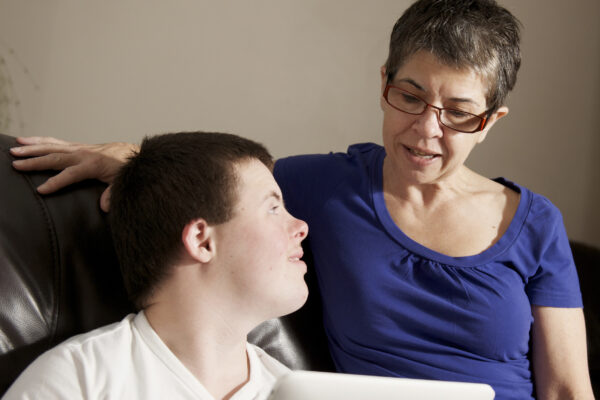Changes to benefits at 16
Many parents are used to claiming benefits to help meet some of the additional costs of caring for their disabled children. As your child reaches 16, and when circumstances change – for example they leave education or begin to claim their own benefits – your family’s income may be affected. It’s important to be aware of the things that may change and seek advice to ensure you and your child make the right financial decisions.
Changes to parent carer benefits
What benefits are you getting now?
The benefits you are claiming now for a young person may include:
- Child Benefit
- Child Tax Credit
- Additional amounts for a dependent child or young person paid with Universal Credit
- Additional amounts for a dependent child or young person paid with Income Support or income-based Jobseeker’s Allowance.
- Additional amounts included in the assessment of any Local Housing Allowance (Housing Benefit) and Council Tax support you claim.
Generally these payments continue automatically until the September after your child’s 16th birthday.
For information about Disability Living Allowance and Personal Independence payment see the section on Benefits for your young person.
Continuing to claim benefits when your child turns 16
Once your child turns 16, you can only continue to get payments for a dependent young person if they are attending a course of full-time, non-advanced education, or in certain types of approved training. In this case, payments can usually continue up to their 19th birthday but will stop if they leave education or training before that date.
Payments for most benefits can be extended to a young person’s 20th birthday if they’re completing a course they started, were enrolled on, or offered a place on, before they turned 19. If you are claiming Universal Credit however, payments can only be extended until the September after their 19th birthday.
What counts as full time, non-advanced education?
- ‘A’ levels and below
- NVQ/SVQ Level 3 and below
- Ordinary National Diplomas and B-TEC National Diplomas and National Certificates.
- Life-skills courses like ASDAN or other training for young people with special educational needs.
To count as full-time, classes, tuition and any supervised study must amount to more than 12 hours a week during term time. It doesn’t include meal breaks or unsupervised study.
In England, if your young person has an EHCP, the number of hours don’t matter as long as the course is named in the plan as “appropriate full-time education”.
Home education may count in some cases. If you are home educating, get written confirmation from your local authority that you are providing “appropriate full-time education”.
Ensuring your benefit payments continue beyond 16
Child Benefit
The Child Benefit office will write to you during the school year that your son or daughter turns 16. They will ask if your child will be staying on in full-time education or approved training, and when you expect them to leave. If you say they are leaving full-time education or training, your Child Benefit will stop. It will also stop if you don’t return the form.
You could get extended Child Benefit for up to 20 weeks if your child is 16 or 17, has left approved education or training, and has either:
- registered for work, training or full-time education with a ‘qualifying body’ (for example, a careers service or Connexions)
- signed up to join the armed forces
Apply online using form CH299. You will need a Government Gateway user ID and password. If you do not have a user ID, you can create one when you apply.
Tax Credits
The Tax Credits Office automatically assumes any young person will leave education in the summer after they turn 16 and will stop payments for them from the September after their 16th birthday unless you tell them otherwise. For tax credits to continue, contact the Tax Credits Office (0345 300 3900) during the summer. Tell them your young person will continue in non-advanced education or approved training.
Similarly, if you have a 17, 18 or 19-year-old who will be staying on in education after the summer holidays, make sure that you let the Tax Credits Office know.
When parent carer benefits stop
In most cases, you will no longer be able to claim benefits or tax credits for your child as a dependent when:
- they leave school or college
- they move into further (advanced) education such as a university course
- they start work
- they start to claim benefits in their own right
Exceptions for interrupted education
If your child is temporarily unable to continue their non-advanced studies (for example because of ill-health) there are exceptions that may allow your Child Benefit and Tax Credit payments to continue for longer. Read paragraph TCTM02230 of the Tax Credit Technical Manual and paragraph CBTM07050 of the Child Benefit Technical Manual.
In most cases, Universal Credit payments are likely to stop if your child is unable to continue their course. However, you may be able to argue that your child should still be included in your Universal Credit as long as they are enrolled. National charity, Contact, can offer advice about temporary interruptions to education.
What changes if your young person claims Universal Credit?
If your young person claims UC, it will affect your family benefits in the following way:
Child Benefit
If a young person claims UC, parents are not entitled to claim Child Benefit, even if their child is still at school.
Child Tax Credit (CTC)
Parents are not entitled to claim Child Tax Credits (CTC) if their child claims UC in their own right.
Carers Allowance
You can still claim Carers Allowance if your child claims UC.
Universal Credit
Once a young person claims UC in their own right, their parent loses all child related elements of their own Universal Credit claim for that young person and will:
- Have to sign on for work – unless they are also disabled or have another younger disabled child in the family, or a baby
- Lose the child and disabled child element of UC they were claiming
- Lose the family premium element of UC– if the disabled young person is the youngest or only child
- Lose the disabled child premium of any Local Housing Allowance (Housing Benefit) they’re entitled to claim
Your own UC will now be less.
Read more about disabled young people claiming Universal Credit below.
Benefits for your young person
Personal Independence Payment
When a young person with additional needs reaches 16, they will no longer be able to claim Disability Living Allowance (DLA). If they still have significant needs, they will need to apply for Personal Independence Payment (PIP) instead.
If your child is already getting DLA
You and your young person will be invited to claim PIP by the DWP, though there is no set date when this will happen. Complete the PIP claim as soon as it is sent to you. You may be able to get help with this from Amaze.
Decisions on PIP claims can take 6 months or more but, thankfully, your child’s DLA award will continue until the PIP claim process is complete.
Because of this, it’s vital that you complete any DLA reviews that are sent to you by the DWP, even if it’s a couple of months before your child turns 16. If you don’t, your young person’s DLA will stop at 16 and there will be a gap until their PIP claim is approved.
If your child is not currently getting DLA
If your child is likely to be entitled to claim DLA but you haven’t done so yet, it’s worth claiming before they turn 16, even if it’s only a few months before their birthday.
If you are successful, this will mean that their DLA award will run beyond 16, until any PIP claim is complete.
Read more about claiming DLA.
Read more about claiming PIP.
Universal Credit
In most cases, you have to be 18 years old or over to claim Universal Credit (UC). Your young person may qualify for UC at 16 or 17 if they:
- have limited capability for work or
- have a ‘fit note’ and are waiting for a work capability assessment
and as long as they are not at residential school or college.
A young person will need a ‘fit note’ from their GP before they start any post-16 course so be sure to organise this in the summer holidays. Young people meeting the criteria are likely to have severe and complex needs.
Universal Credit is ‘means tested’ – so other income and savings are taken into account when deciding how much your young person needs to live on. If your child is a beneficiary of a discretionary trust, it shouldn’t be taken into account when calculating their entitlement to benefits – as long as they aren’t getting a regular income and purchases made by the trustees on your child’s behalf are irregular.
If a young person has savings or investments between £6,000 and £16,000 their Universal Credit payments will be reduced by £4.35 for every £250 they have between £6,000 and £16,000. If they have more than £16,000, they cannot claim UC.
Parents’ savings and income don’t affect a young person’s claim to UC.
Should they claim UC?
If your household isn’t getting any low-income household benefits like tax credits or Universal Credit (UC), it makes sense for a young person who meets the strict eligibility criteria, to claim Universal Credit at 16, because UC is worth a lot more than the Child Benefit that will be lost.
If your household is getting the full entitlement to tax credits or UC, it probably isn’t worth a young person claiming UC at 16.
If your household is only getting some tax credits, you may want to get advice. Money Advice Plus and your local Jobcentre Plus or Citizen’s Advice can help you do a ‘better off calculation’.
The 16-19 Bursary Fund
Young people aged 16-19 who stay on at school or college in England may be eligible for a bursary to help pay for the costs of non-advanced education such as transport, clothing, equipment and stationary.
They will need to be claiming DLA or PIP, or get Universal Credit, as well as be enrolled on an eligible course to qualify for a ‘vulnerable bursary’ of £1,200 a year.
Remember though that if a young person claims Universal Credit to qualify for the vulnerable student’s 16-19 bursary, you will no longer get any benefits for them as a dependent child.
See Gov.uk for more information about 16 to 19 Bursary Fund eligibility.
Managing money
From the age of 16, payments of PIP will usually be paid directly to a young person. If they claim Universal Credit or any other benefits as a young adult, this will usually be paid to them rather than to you too.
If your young person is capable of making a claim for PIP or UC independently, it makes sense for them to do so. It will build their confidence and help equip them for other adult responsibilities.
Your young person can claim benefits in their own right, even if they need someone else to act on their behalf. This usually means you or another carer taking on the role of ‘appointee’ and managing their money for them.
Becoming an appointee
If your child is unable to manage their own benefits, you can become their appointee. This means taking on legal responsibility to make claims on a young person’s behalf and for managing any money they receive from benefits. Being an appointee also means you are responsible for alerting DWP or HMRC about any changes in your child’s circumstances.
You will only be made an appointee if the DWP agrees that your child lacks the capacity to manage their own benefits. Arguing that a young person will spend the money unwisely, is not enough. As a young adult, your child is entitled to spend their money foolishly. DWP are more likely to accept that because of learning disability or mental health needs having control of their own benefits might make them more vulnerable to financial abuse. You cannot be made appointee because it is a more convenient way to manage your household budget. Becoming an appointee does not give you any wider powers, for example to make decisions about their care or health.
How do I become an appointee?
If your child already gets DLA, the DWP should write to you in the six months before your child turns 16. This should happen at the same time they send you information about moving onto PIP. If this doesn’t happen automatically, or if you have never claimed DLA or PIP up to now for your child and they are at least 16 and you believe they cannot manage their benefits, contact the DWP to tell them that you think your child needs an appointee.
The DWP will usually arrange a home visit and want to meet a young person to assess if they need an appointee. If your child says they want to manage their own benefits at 16, this is what will happen.
In some circumstances, DWP may agree a young person needs an appointee without making a home visit. In our experience, DWP may accept supporting evidence such as an EHC Plan or a psychiatric assessment.
If the courts have already appointed you to look after your child’s affairs, for example as a deputy or guardian, you will just need to provide evidence of these court appointed powers.
Read more about Rights, voice and decision-making for young disabled people.
Get help from Amaze
Parent carers and young people in Brighton & Hove and East Sussex can get help with claiming Disability Living Allowance (DLA) and Personal Independence Payment (PIP) from Amaze. We offer:
- online advice, fact sheets and targeted resources to help you make a claim
- regular Zoom workshops on claiming DLA or PIP
- targeted support to families facing extra challenges via our DLA and PIP Advice Service

Other sources of help
Money Advice Plus can give advice about entitlements to benefits, and support you to make claims and help you do a better off calculation.
Citizens Advice have specialist ‘Help to Claim’ advisors to support vulnerable clients to claim Universal Credit. They can also go online and do a ‘better off calculation’ for you to help you understand how the benefits your child claims might affect yours.







